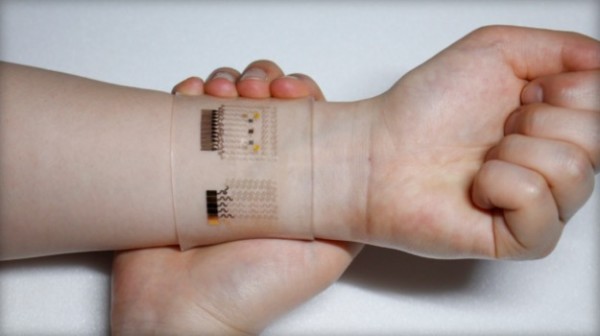By Steve Pak, | March 23, 2016

Diabetes Skin Patch
Diabetes testing could be done in the future using a painless skin patch based on a new invention. Korean researchers have developed a diabetes monitoring device that checks blood sugar in sweat and uses tiny needles to deliver a drug to treat the major disease.
The study was conducted by Seoul National University (SNU) in the Republic of Korea and funded by the Institute for Basic Science. Researchers' findings were published online in the journal Nature.
Like Us on Facebook
Study author Hyunjae Lee explains that diabetics often avoid blood glucose tests because the blood-collecting process is painful, according to CBS News. The new skin patch system provides non-invasive monitoring and treatment for diabetes patients.
Diabetics now have two options to check their blood sugar levels. One choice is a blood glucose meter that uses a finger stick to collect one drop of blood for testing. The other option is non-stop blood sugar monitoring that requires a sensor to be worn under a patient's skin. Both of the options are invasive and sometimes painful.
The Korean researchers used a substance called graphene to build a thin and elastic patch. They explain that it conducts electricity and can be thin, soft, and clear.
The skin patch contains many sensors that detect temperature, humidity, pH level, and sweat sugar levels; and contains tiny heat-sensitive needles.
Lee explains the patch measures sweat glucose, and then calculates blood sugar levels. The patch's sensors are just as accurate as home blood glucose monitors in the United States.
In the past a similar device called GlucoWatch transferred fluid from the skin to the gadget, in order to measure glucose levels. However, the product had low sales figures so it is no longer sold.
Tae Kyu Choi is another study author from SNU. He explains the gadget includes a humidity sensor so heavy sweaters would not affect the blood sugar readings.
In related news a new study published in Diabetes Care shows that type 2 diabetes can be reversed even among long-term diabetics, according to Science 2.0. Patients who keep their body weight down after reversing the blood sugar disease can stay diabetes-free up to one decade.
Here's how to prevent type 2 diabetes:
-
Use of Coronavirus Pandemic Drones Raises Privacy Concerns: Drones Spread Fear, Local Officials Say

-
Coronavirus Hampers The Delivery Of Lockheed Martin F-35 Stealth Fighters For 2020

-
Instagram Speeds Up Plans to Add Account Memorialization Feature Due to COVID-19 Deaths

-
NASA: Perseverance Plans to Bring 'Mars Rock' to Earth in 2031

-
600 Dead And 3,000 In The Hospital as Iranians Believed Drinking High-Concentrations of Alcohol Can Cure The Coronavirus

-
600 Dead And 3,000 In The Hospital as Iranians Believed Drinking High-Concentrations of Alcohol Can Cure The Coronavirus

-
COVID-19: Doctors, Nurses Use Virtual Reality to Learn New Skills in Treating Coronavirus Patients











